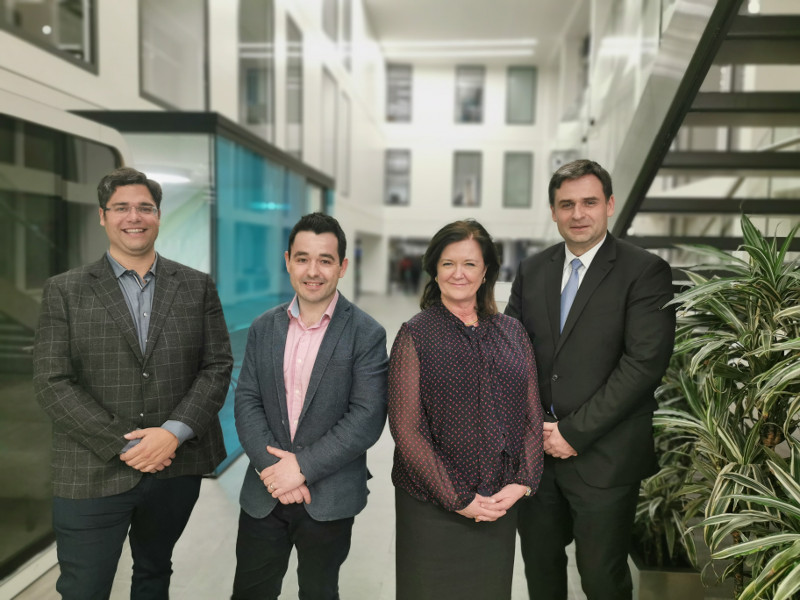Podcast Ep 152: Bank of Ireland’s head of Tech, Media and Telecoms Paul Swift analyses the new AI arms race sparked by ChatGPT and explains what it means for businesses.
In November a new epoch in tech began with the launch of ChatGPT from OpenAI. The breakthrough was the platform’s ability to answer search queries in a conversational way with natural language instead of simple lists of links. Not only that but the technology could be used to write articles and more. Think of it as trumping search engines as we know them as well as putting automation on light speed.
Microsoft’s almost immediate decision to integrate this technology into its Bing search engine and Edge web browser began a new arms race that has the titans of tech falling over themselves to keep up.
“It does present the potential to also replace people in roles like customer care, which is a very real conversation taking place”
Already Google has rushed into the fray with its rival technology Bard, albeit with something of an ignominious start where wrong answers were generated leading the search giant a little red-faced.
Facebook for its part has already set the AI cat among the analogue pigeons by revealing it plans to replace swathes of middle managers with AI tools instead.
This isn’t a just a new epoch of technology, it could create a whole economic world order.
Making AI work for you
“Just tread carefully and try and test to see what it offers you”
Writing in his Tech, Media and Telecoms (TMT) 2023 H1 Outlook, Bank of Ireland’s head of TMT Sector Paul Swift pointed out that ChatGPT platform and others like it can be used in any number of ways where human conversations take place, offering potentially infinite uses for the technology, e.g., hiring and training staff, personalised shopping/customer experiences and even streamlining of processes. Some use cases include:
- Customer care: conversational type, automated responses, where one receives a more personalised reply to their inquiry.
- Journalism: creation of content for news articles, reports and research.
- Branding and marketing: creation of personalised, engaging content, harnessing market research, tailored to specific market niches and segments.
- Personal fitness nutrition: creation of weekly training programs, including exercises, reps, sets and specific advice on when to warm up and cool down and associated meal plans based on the individual.
Swift offered the following caveat: “The capabilities and potential of this technology can perhaps appear scary, as it is giving rise to the fear that this will lead to job roles being redefined/lost much sooner. While this is revolutionary technology, it does have limitations as it can only provide answers based on the data it has been trained on. OpenAI acknowledge the technology has limited knowledge of events after 2021. Similarly, it cannot handle nuanced, complex, or sensitive inquiries and does not have the ability to think or act creatively.
“There are lots of potential ethical implications too as it could result in the spread of fake news or could potentially be used to generate false or misleading information. Academics too recently tested the technology and produced responses to exam questions they say would have resulted in full marks if they were submitted by an undergraduate.”
Speaking on The ThinkBusiness Podcast Swift said that it is important that businesses don’t get left behind.
“I think they should be testing it and looking at it. I think it is very useful and this is where technology is evolving to.”
Swift recommended businesses could start by asking ChatGPT interesting questions or using the technology to glean interesting market insights for their respective sectors.
“The key thing to remember is it is just another tool in our armoury. It could be used for identifying specific niches in marketplaces or to find new customers.”
He emphasised that it is still a new technology and that businesses should also tread carefully. “It gives you certain insights but you still need to validate those because not every answer is going to be perfect or correct. But I think as a tool it is very interesting to see this development – it’s kind of scary and interesting in equal measure.
“It does present the potential to also replace people in roles like customer care, which is a very real conversation taking place. Anywhere that people converse, there could almost be an infinite amount of instances where it can be used.
“Just tread carefully and try and test to see what it offers you.”
Crucially it is still early days for the technology and in his Insights report Swift pointed out how its creators have referred to the ‘eye-watering’ computing costs, with some estimates of up to $3m per day. The likelihood, Swift predicted, is there will be a premium version for business coming on stream before too long.
“Some of the answers it is giving back are plausible and they are lifting those answers from various sets of data. So I think it’s worth exploring. Definitely, the line in the sand has been drawn. We are moving to a new dimension and that started in late November.”
Main image at top: Photo by Jonathan Kemper on Unsplash
-
Bank of Ireland is welcoming new customers every day – funding investments, working capital and expansions across multiple sectors. To learn more, click here
-
Listen to the ThinkBusiness Podcast for business insights and inspiration. All episodes are here. You can also listen to the Podcast on:
-
Spotify
-
SoundCloud
-
Apple




